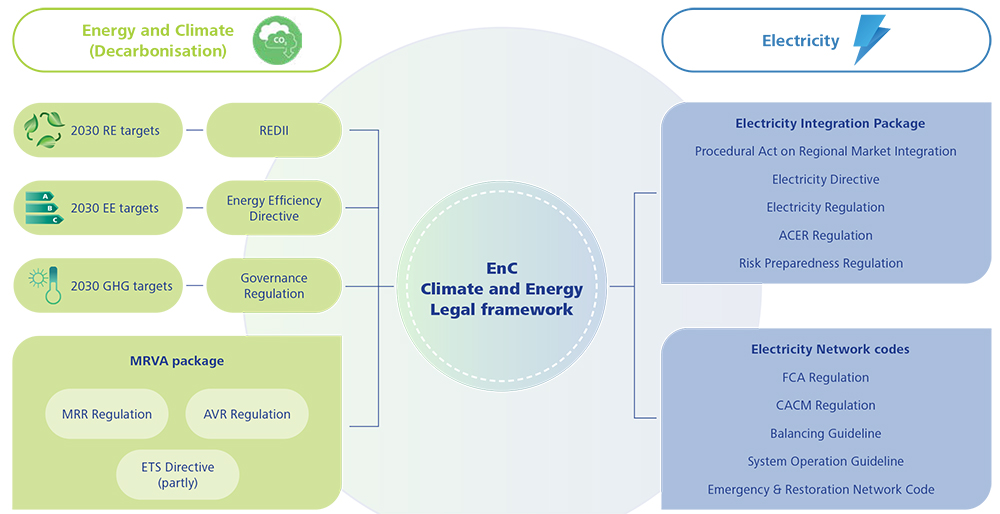While the adopted climate and energy package provides a stable legal framework for the energy transition and market integration, it is essential to accelerate its transposition and implementation. The recently adopted EU Regulation (EU) 2023/956 on the Carbon Border Adjustment Mechanism (CBAM) will serve as a catalyst for this process. It imposes administrative and financial costs on importers of CBAM goods into the EU from third countries, including the Contracting Parties.
Regarding the import of electricity, there is a possibility of exempting it from the application of CBAM if the third country’s electricity market is integrated with the EU market and meets certain conditions related to climate and energy legislation.
- Stipulating market coupling as one of the exemption conditions, CBAM Regulation amplifies the urgency of setting up short-term markets and completing their integration in the EU’s SDAC and SIDC by the end of 2025.
- The exemption conditions include implementing an emissions trading system (ETS) by 2030.
The close connection between electricity market integration and decarbonization through CBAM calls for a more aligned approach to policy planning, implementation, and monitoring.

This page takes a closer look at the exemption clauses and assesses the Contracting Parties' readiness to meet the CBAM exemption conditions.
Meeting the CBAM exemption conditions for electricity imports into the EU
-
Exemption clause
Applicable exemption clause: Article 2(7) of CBAM Regulation
EXEMPTION If a third country or territory has an electricity market which is integrated with the Union internal market for electricity through market coupling, and there is no technical solution for the application of the CBAM to the importation of electricity into the customs territory of the Union from that third country or territory, such importation of electricity from that country or territory shall be exempt from the application of the CBAM, provided that the Commission has assessed that all of the following conditions have been fulfilled in accordance with paragraph 8.
-
Condition: Obligation to apply Union law
Condition: obligation to apply Union law
CONDITION STATUS a) concluded an agreement with the Union which sets out an obligation to apply Union law in the field of electricity, including the legislation on the development of renewable energy sources, as well as other rules in the field of energy, environment and competition The Energy Community Treaty is an agreement signed between the EU and the Contracting Parties
that obliges the latter to apply EU acquis on energy, renewables, environment and competition. -
Condition: Transposition and implementation
Condition: Transposition and implementation of EU legislation
CONDITION b) implemented the domestic legislation the main provisions of Union electricity market legislation, including on the development of renewable energy sources and the market coupling of electricity markets. STATUS: ELECTRICITY MARKET ACQUIS Energy Community The latest EU electricity market acquis is fully incorporated in the Energy Community by Ministerial Council Decisions 2021/13/MC-EnC of November 2021 and 2022/03/MC-EnC of December 2022. The deadline for transposition of these acts is 31 December 2023 and respective activities are ongoing in all Contracting Parties. Contracting Parties Apart from Ukraine, which has already submitted a couple of draft Laws for the Secretariat’s review. Serbia, Kosovo*, and Moldova are expected to submit draft Laws for the Secretariat’s review in July, August, September 2023, respectively. Other Contracting Parties announced delay in drafting, which is expected to result in missing the transposition deadline. STATUS: RENEWABLES ACQUIS Energy Community
The RED II Directive has been incorporated in the Energy Community by Ministerial Council Decision 2021/14/MC-EnC as amended by Decision 2022/04/MC-EnC. The deadline for transposition expired on 31 December 2022. Contracting Parties In April 2023, Albania adopted amendments to its RES Law, partially transposing the Renewable Energy Directive (REDII). In Bosnia and Herzegovina (BiH), Republika Srpska adopted a RES law in early 2022 that partially transposed the REDII, while in the Federation of BiH, a similar law has been drafted and awaits adoption by the Parliament. Kosovo* and Montenegro are in the process of preparing their first stand-alone RES law. In Georgia and Moldova, amendments to the RES Laws are prepared. In North Macedonia, the REDII has been partially transposed in the Energy Law. In 2023, Serbia adopted amendments to its RES law in April and has taken necessary steps to adopt secondary legislation, culminating in the launch of the first auctions for solar and wind projects in June. In Ukraine, amendments to laws, particularly concerning auctions, guarantees of origin, and self-consumption, are currently in Parliament. STATUS: MARKET COUPLING OF ELECTRICITY MARKETS Energy Community
No electricity market coupling between Contracting Parties or with the European Union’s internal market for electricity has taken place yet. The newly adopted Electricity Integration Package, namely the Electricity Regulation, the ACER Regulation, the CACM Regulation and the Procedural Act on Regional Market Integration, sets a legal framework for the coupling of the Contracting Parties electricity markets into the European single day-ahead coupling (SDAC) and intraday coupling (SIDC), based on the principle of reciprocity between the energy sector stakeholders from both Contracting Parties and EU Member States. The transposition of these acts by the Contracting Parties by 31 December 2023, will set a legally binding framework for the market coupling. Contracting Parties While all Contracting Parties are currently working on the full transposition of the Electricity Integration Package, some Contracting Parties have already partially transposed and started to implement the CACM Regulation, mainly to designate the NEMO(s) for which the deadline was due on 15 June 2023 (List of NEMOs). A plan on integration of NEMOs from Contracting Parties in the EU market coupling operator (MCO) functions and their adherence to the corresponding agreements between NEMOs and with third parties shall be submitted by all Contracting Parties and EU Member States NEMOs by 15 December 2023. -
Condition: Roadmap submitted
Condition: Roadmap submitted to the Commission
CONDITION STATUS c) Submitted a roadmap to the Commission which contains a timetable for the adoption of measures to implement the conditions set out in points (d) and (e); The Contracting Parties have yet to develop and submit the roadmap to the European Commission. The Secretariat was invited by the Athens Forum to coordinate the development of a CBAM roadmap and a regional approach to the fulfillment of the exemption conditions. -
Condition: Climate neutrality by 2050
Condition: Committed to climate neutrality by 2050
CONDITION d) committed to climate neutrality by 2050 and, where applicable, has accordingly formally formulated and communicated to the United Nations Framework Convention on Climate Change (UNFCCC) a mid-century, long-term low greenhouse gas emissions development strategy aligned with that objective, and has implemented that commitment in its domestic legislation. STATUS: UNDERTAKEN COMMITMENT According to the Decarbonisation Roadmap adopted by the Ministerial Council in 2021, the Contracting Parties support a path toward climate neutrality by 2050. STATUS: COMMUNICATED LONG-TERM LOW GHG EMISSIONS DEVELOPMENT STRATEGY TO UNFCCC For now, North Macedonia and Ukraine remain the only Contracting Parties which have submitted their long-term low GHG emissions development strategy to UNFCCC. Georgia has adopted its strategy in 2023, but it is yet to be communicated to UNFCCC. STATUS: IMPLEMENTED COMMITMENT IN NATIONAL LEGISLATION No Contracting Party has implemented the climate neutrality commitment in its national legislation, except Georgia which has the 2050 climate neutrality target placed in its long-term low emission strategy. Several Contracting Parties are working on upgrading their climate laws. -
Condition: Alignment, carbon pricing and ETS
Condition: Progress in alignment, carbon pricing and ETS
CONDITION e) when implementing the roadmap referred to in point (c), demonstrated its fulfilment of the set deadlines and the substantial progress towards the alignment of domestic legislation with Union law in the field of climate action on the basis of that roadmap, including towards carbon pricing at a level equivalent to that in the Union in particular insofar as the generation of electricity is concerned; the implementation of an emissions trading system for electricity, with a price equivalent to the EU ETS, is to be finalised by 1 January 2030. STATUS: SUBSTANTIAL PROGRESS IN ALIGNMENT OF DOMESTIC LEGISLATION WITH EU CLIMATE LAW Several Contracting Parties are working on aligning their climate legislation with the EU rules. Albania, Montenegro and Serbia adopted climate laws. North Macedonia is advanced in the process and has a finalized draft already in public consultation. Georgia and Ukraine are also currently developing climate framework legislation. STATUS: INTRODUCTION OF CARBON PRICING WITH THE PRICE EQUIVALENT TO THE EU Only Montenegro and Ukraine have carbon pricing in place but at a level much lower than the price under the EU ETS. STATUS: IMPLEMENTATION OF ETS WITH PRICE EQUIVALENT TO EU ETS BY 2030 At the Energy Community level, the next steps are to be taken within the framework of the Energy Community Decarbonisation Roadmap. -
Condition: System to prevent indirect import
Condition: Effective system to prevent indirect import set in place
CONDITION STATUS f) put in place an effective system to prevent indirect import of electricity into the Union from other third countries or territories that do not fulfil the conditions set out in points (a) to (e) No system is designed yet. Its design will depend on the exposure of a Contracting Party to imports from third countries, or from other Contracting Parties that do not fulfil the above conditions, especially if no regional approach with a roadmap at the Energy Community level would be agreed.

